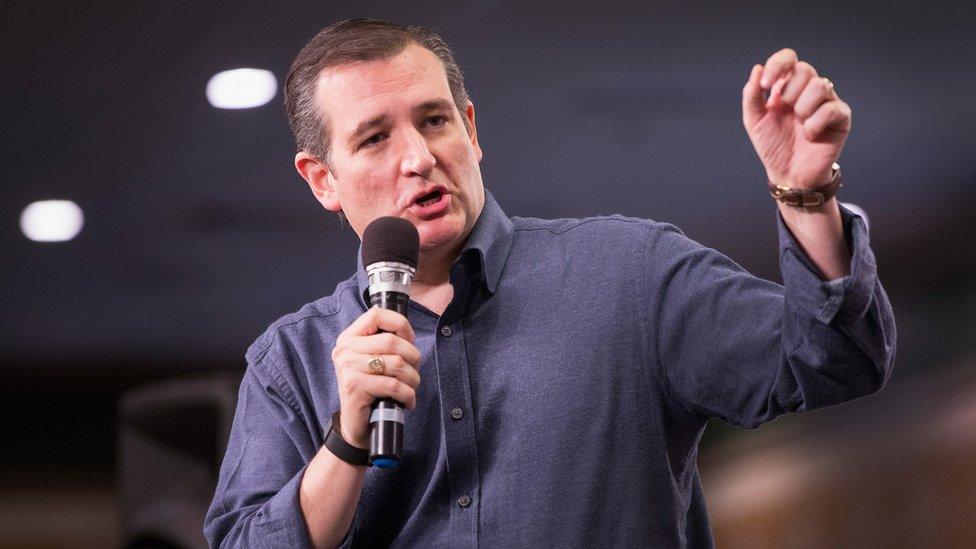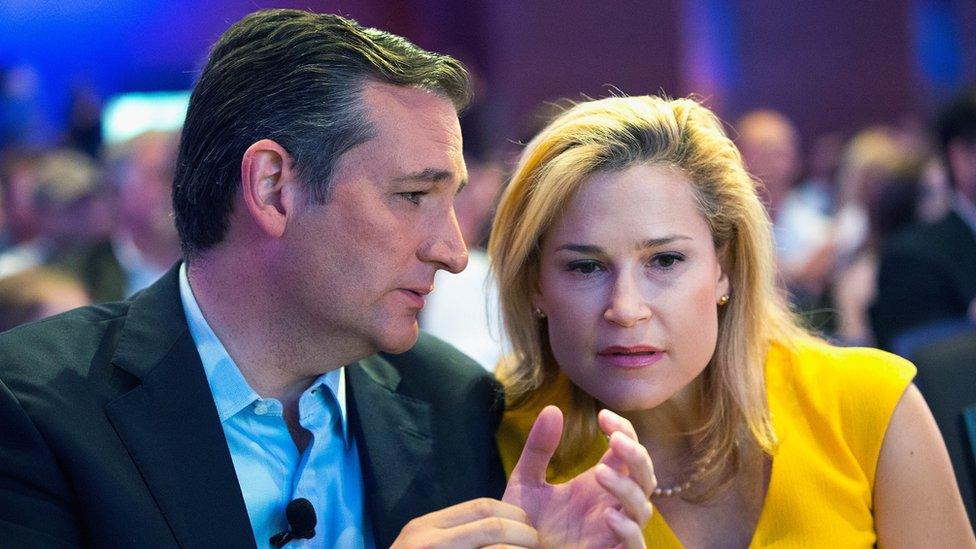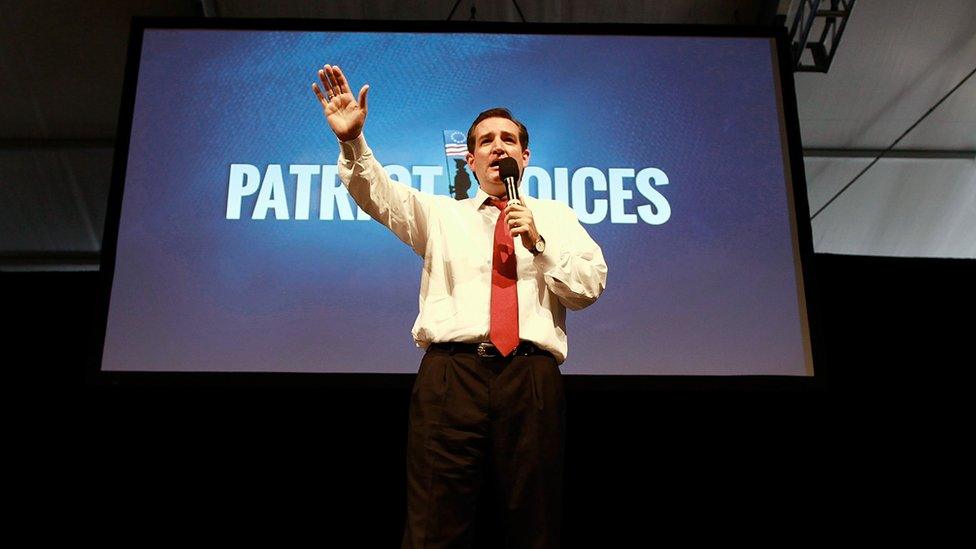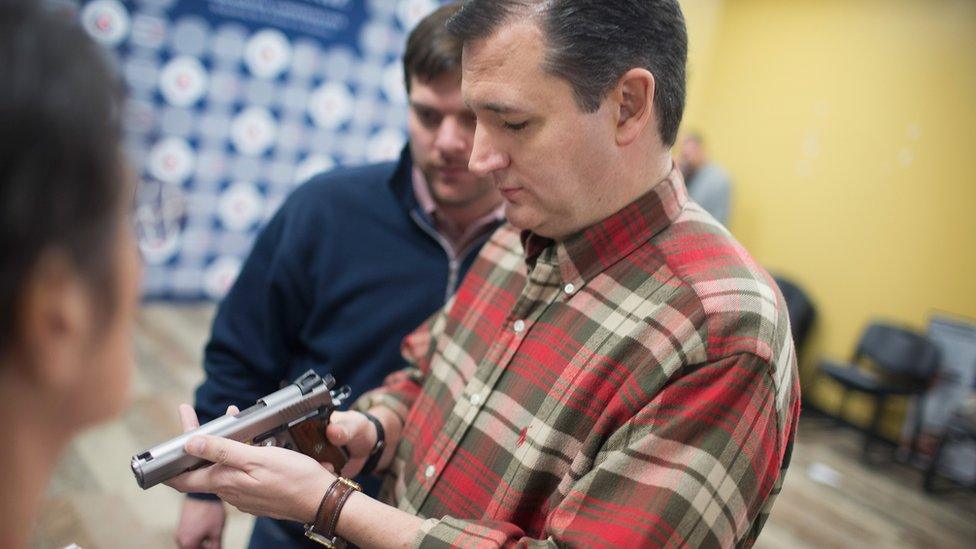Ted Cruz's rapid, rocky ascension to presidential candidate
- Published

Before ending his campaign, Texas senator Ted Cruz hoped to overtake Donald Trump for the Republican presidential nomination.
After a long, contentious presidential campaign, Cruz was the last Republican candidate standing in the way of a Trump nomination.
On 3 May, the ultra-conservative junior senator from Texas ended his presidential bid after the Indiana primaries gave a clear win to Trump.
In his short political career, the 46-year-old has gained a reputation as the "most hated man in Washington", external who often clashes with his own party.
Most recently, he was described as "Lucifer" by the former House Speaker, John Boehner.
But Mr Cruz was also lauded as possibly the only candidate who could appeal to a conservative base fed up with establishment Republicans.

Ted and Heidi Cruz at the Religious Liberty Rally
Early life
Rafael Edward Cruz was born in 1970 in Calgary, Canada (a fact which would later be used against him by rivals in his future presidential run). His mother was an American citizen, which gave him a dual Canadian-American citizenship, and his father was a Cuban immigrant who came to the US to escape the Batista regime. The Cruz family moved to Houston, Texas, in 1974. Later, a 13-year-old Rafael Cruz began going by "Ted" to fit in better.
He attended Princeton University, where he was a hall of fame debater, and then Harvard Law School, where he became an editor at the Law Review. Former classmates have mixed remembrances, external of him, from a roommate who said he would rather pick a name from the phone book rather than see Mr Cruz president, to his debate partner who said Mr Cruz was a "very, very gentle-hearted person".
Mr Cruz became the first Hispanic to clerk for a Chief Justice of the Supreme Court (William Rehnquist) in 1996, then joined a boutique law firm in Washington DC where he worked on cases for the National Rifle Association and other prominent Republican clients.
He met his wife Heidi Nelson while they were both policy advisors on the George W Bush campaign in 2000. They have two young daughters.

Mr Cruz campaigning for US Senate
Political beginnings
Mr Cruz became an associate deputy attorney general with the US Department of Justice during the Bush administration, before getting a call to return to Texas. The state's attorney general hired him to become the Texas solicitor general, and he argued nine cases in front of the Supreme Court in that role.
He told the New York Times , externalhis mandate as solicitor general was to "seek out" cases that would "lead conservative fights". He argued in favour of the death penalty and late-term abortion bans, and claims to have worn a pair of ostrich-skin cowboy boots, external to every important case.
In 2012, he ran for an open US Senate seat in Texas against a better known and better financed opponent. He eked out a win by identifying as a Tea Party hardliner, and conservative celebrities like Sarah Palin rallied to his side. It was the first time Mr Cruz held public office.
The freshman senator quickly gained a reputation as a hard-charging, ultra-conservative who ruffled feathers within his own party. He is credited with having a large role in the federal government shutdown in 2013, and spoke for 21 hours on the Senate floor as part of an attempt to delay or defund the Affordable Care Act. He joined a filibuster over US drone policy, for which Senator John McCain famously called him a "wacko bird", external.

Mr Cruz at an Iowa gun range
The candidate
Mr Cruz announced his candidacy for the 2016 presidential contest at the Christian Liberty University and vowed that he would not surrender his principles in order to become more electable. That had been an appealing message to Christian social conservatives and Tea Partiers, and Cruz made headway in the polls.
He promised to combat the "war on faith", defund Planned Parenthood and dismantle Obamacare. He is a staunch supporter of Second Amendment gun rights. He wanted to increase deportations and secure the US border with Mexico. Above all else, he ran a campaign as a Washington outsider.
On 3 May, after he lost six state contests in a row, Cruz ended his campaign, making Trump the presumptive presidential nominee for the Republican party.
"We gave it everything we've got," he told a dismayed crowd of supporters. "But the voters chose another path."